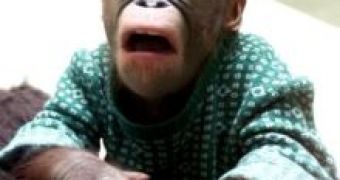We laugh when we find something as being funny, but we also laugh when we are tickled. Sometimes we even laugh when we are in some awkward situation - the nervous laugh. On average, we laugh more than 15 times a day. But why do we laugh? What function does laughing serve, and why did it appear in the first place?
First of all, all laughter has a clear mental component. This is shown by the somewhat surprising fact that you can't tickle yourself - therefore tickling is not a built-in reflex, you need an element of surprise and tension.
Scientists think that laughing has a social function - it gives some kind of information to others. The fact that you laugh when you are being tickled seems to be only a side effect of how laughter generally functions and not some basic and primitive form of humor. That humor serves primarily a communication function is clear from studies showing that people are 30 times more likely to laugh in social settings than when they are alone. Moreover, the German psychologist Willibald Ruch has proved that laughter cannot be a mere reflex reaction to some stimuli by showing that even nitrous oxide (the laughing gas) loses much of its power when taken in solitude.
But what kind of information does laughter transmit? Philosophers and psychologists have come up with three basic theories about why we laugh (they don't necessarily exclude each other):
According to the incongruity theory humor arises when logic and familiarity are replaced by things that don't usually go together. Researcher Thomas Veatch for example thinks that laughter is simply the brain's response to two sets of incompatible thoughts and emotions occurring simultaneously.
According to the superiority theory (that dates back to Aristotle) we laugh when we see somebody else doing something stupid or having some kind of misfortune and we feel superior to this person. When we feel such superiority we laugh. (When we feel superior because we have done something we feel proud of and not amused.)
Finally, the relief theory holds that laughter occurs when tension breaks without anything serious happening. Dr. Lisa Rosenberg pointed out that humor helps people cope with stressful situations.
The relief theory can be seen as a more advanced version of the incongruity theory: tension and stress are often followed by unfortunate things (you usually have good reasons for being stressed), but when they prove baseless an incongruity appears between the tension you feel and what actually has happened. Thus you feel relief and you signal this to other people by laughing.
V. S. Ramachandran explains in his book A Brief Tour of Human Consciousness: "a portly gentleman walking toward his car slips on a banana peel and falls. If he breaks his head and blood spills out, obviously you are not going to laugh. You are going to rush to a telephone and call an ambulance. But if he simply wipes off the goo from his face, looks around him, and then gets up, you start laughing. The reason is, I suggest, because now you know it's inconsequential, no real harm has been done. I would argue that laughter is nature's way of signaling that 'it's a false alarm'." (p.22)
He adds: "The same sort of thing happens in tickling, which may be some sort of crude 'playtime' rehearsal for adult humor. An adult approaches a child with his hands extending menacingly toward vulnerable parts of child's body but then anti-climactically deflates the potential threat with gentle stimulation and a 'Koochy, koochy, koo!'" (p.23)
Thus, it seems that laughter originally evolved as a way of informing our kin that there is no real danger, to tell them "don't waste your precious resources on this situation; it's a false alarm. Laughter is nature's OK signal," argues Ramachandran.
But, as often happens in biology, something that evolves initially for a certain purpose gets preserved later on because it can serve a different function. Laughing may be in the same condition. We might not need it today for the same reasons it originally appeared but it's highly unlikely that laughing will disappear. After all, laughing is fun.
Thus, this explanation helps us understand the psychological mechanism of laughter and why it got to be the way it is, but it doesn't tells us anything about the function it serves today. The more advanced and subtle humor we find today in some books and movies is built on this ancient mechanism, but it puts the machine to a different use. The art of the comedian is how to create novel uses for this old tool.

 14 DAY TRIAL //
14 DAY TRIAL // 

